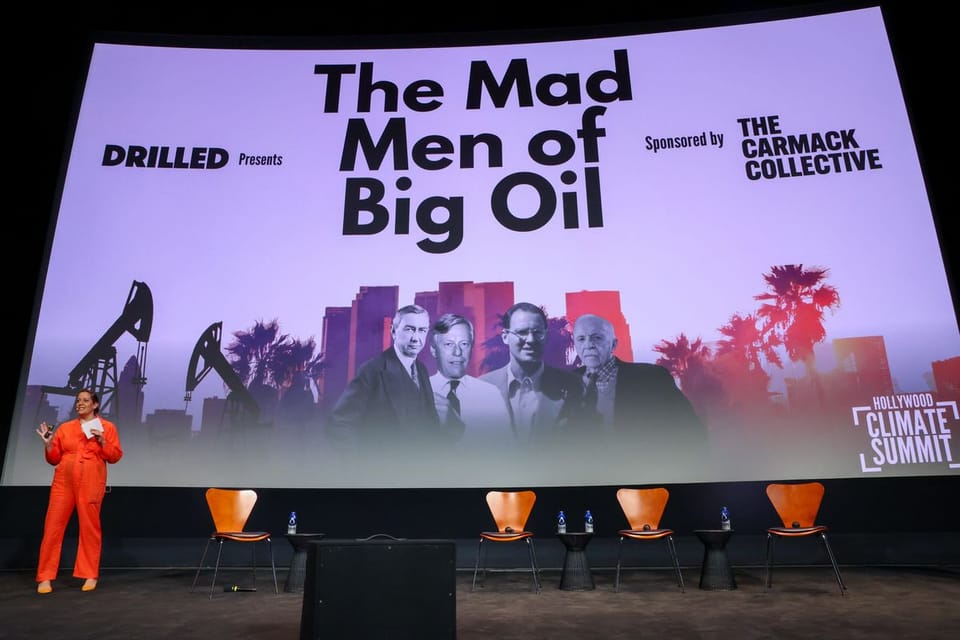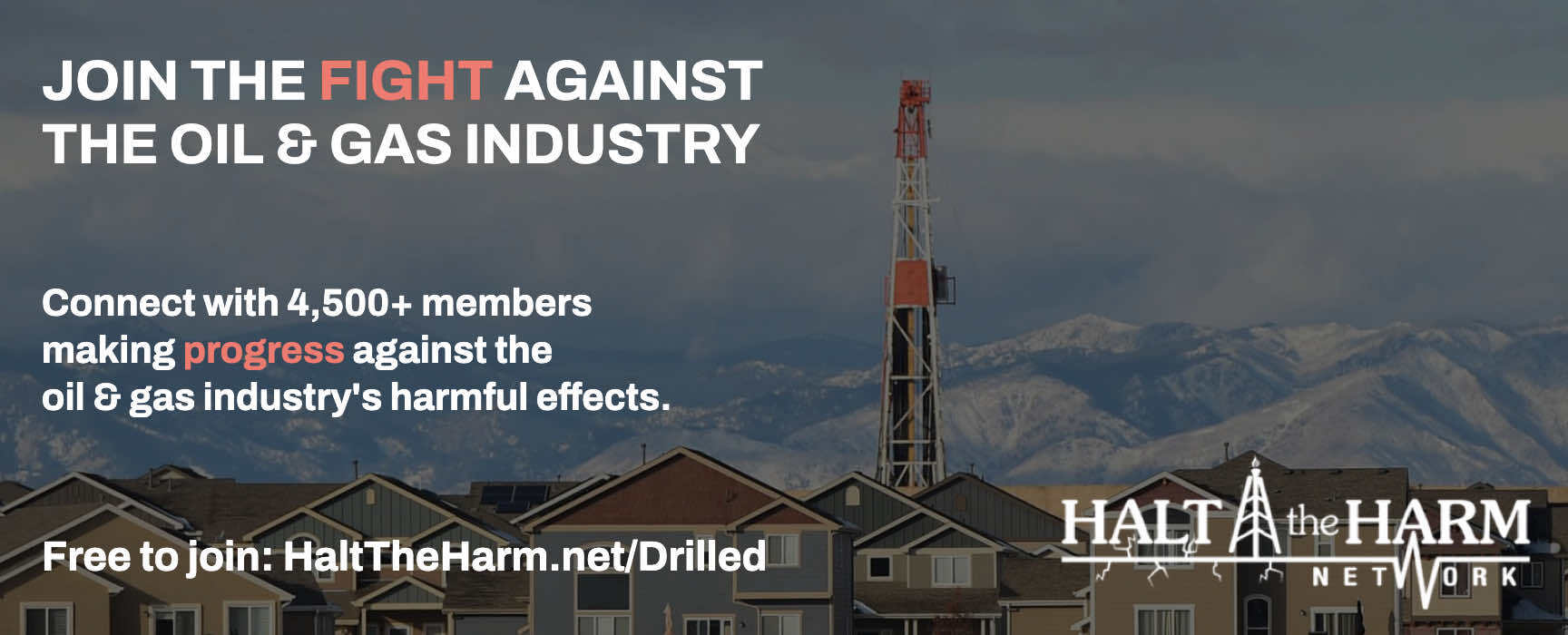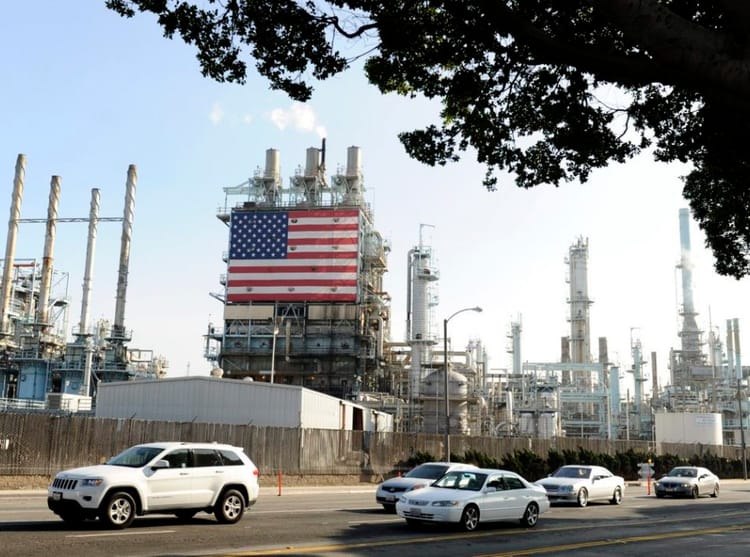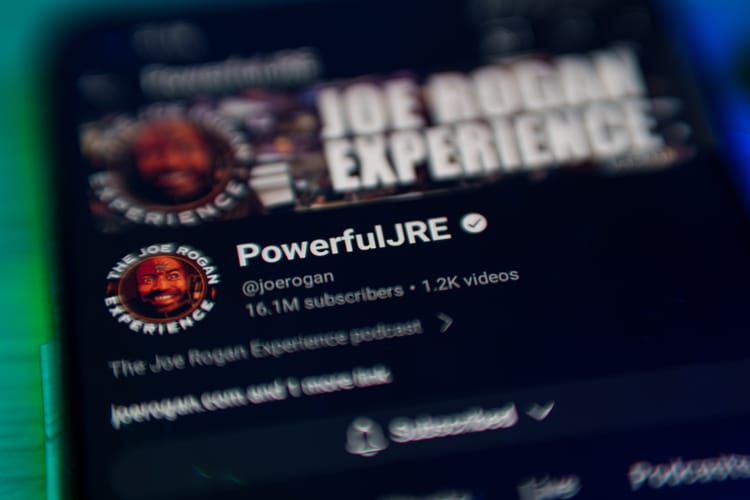On Doom, Denial and Disinfo

I spent this week at the Hollywood Climate Summit, talking to people about the role the PR industry has played in shaping not just how we understand the climate crisis but also nature in general, the environment, the economy, and all sorts of other things. The great writer Mary Annaïse Heglar, writer/showrunner Dorothy Fortenberry, and LA Times climate columnist Sammy Roth joined me for a walk through history and a talk about how creatives, and people in general, might wrestle the narrative back from polluting industries who work very hard to maintain their right to extract from and pollute the commons with impunity.
At the same time, this month we launched a new series focused on a whole new batch of problems the fossil fuel industry has created—new environmental problems masquerading as "climate solutions"—which also had me thinking about PR and disinformation, and how it often gets talked about like something that happened in the past, when it's only gotten more powerful today. Someone I spoke with recently for a story in that series walked through the history of carbon capture technology like this: "The industry created this technology as a way to get more oil out of older reservoirs—enhanced oil recovery came first (EOR), then they realized they could make money selling it as a 'climate solution' so they rebranded it."
Same old tricks, new game. Which can feel overwhelming, especially since it's been going on for so long. But something Dorothy Fortenberry said on our panel really stuck with me: She pointed out that denial and doom are sort of two sides of the same coin. Both allow you to ignore and disengage from the problem. Those who deny that climate change is happening, that there's a clear cause to it, and that there's something we can do about it encourage everyone to keep living as they always have, nothing to see here. Those who believe our fate is sealed and there's nothing we can do to avoid apocalypse throw their hands up and say well if there's nothing I can do, I'm going to enjoy the time I have left, and give up on worrying about it. They wind up in the same place: self interest and inaction. In the middle is struggle and community building, and I realize I am doing a terrible job PR-ing reality here, but that is where we all need to live. Working for better, helping each other out, starting small and growing toward collective action, building communities of care. It's maybe not quite as appealing as the idea that there are no problems and no need for major change, or that we're off the hook for even trying, but I actually think it feels better in the end.
At another conference discussion, the legendary Reverend Yearwood also said something profound, as he often does. Speaking to a room full of folks who work in the TV and film business, he said, and I'm paraphrasing from memory here: "Yes, climate film and TV shows can be appealing to audiences and be successful and be impactful, but you should also make them because it's the right thing to do as humans. Because when people 100 years from now are living through the worst of this crisis, you don't want them to look back and wonder how we could have managed to ignore it."
Whenever I go to conferences or give talks about climate, I'm inevitably asked what gives me hope. I've talked plenty about being fueled more by rage than hope, but there's another thing that keeps me going, two things really: community and conviction. I think I'm focused on the right things, the things that I can do to bring the most information and benefit to the most people, the things I can best do to leave a better world for my kids and everyone else's, and it gives me strength to meet and spend time with other people who are walking a similar path. It lets me know I'm part of a greater whole, and that there are quite a lot of people out there interested in more than their own comfort as we live through decidedly discomforting times.
This week's newsletter is sponsored by Halt the Harm, a network of individuals and groups working together to wrestle power back from the oil and gas industry.

This Week's Must-Reads
- Flouting Biden pause, agency OK’s largest LNG terminal in US (by Pam Radtke for Floodlight) - Sorry to be Debbie Downer on the "pause," but here's another example of just how narrow it is. The Federal Energy Regulatory Commission (FERC) approved the largest LNG export terminal in the country this week, the the $10 billion Calcasieu Pass 2 in Cameron Parish, Louisiana. It may still struggle to get permits to export fuels to certain countries (that's due to the pause), but otherwise the government just cleared a major hurdle for the project, which was proposed more than two years ago.
- How a Top Climate Consultancy is Greenwashing Fossil Fuels (by Maddie Stone for Drilled) - Management consultancies have gotten a free ride for years, avoiding any sort of accountability for the charts, graphs and reports they produce to help the fossil fuel industry continue to grow and greenwash. Here, the great Maddie Stone looks at one example, a firm that does a ton of climate work for the U.S. government, that also happens to be a favorite choice of the fossil fuel industry when it needs to make a dubious claim seem data-based.
- What Is the Opposite of Oil Drilling (by Michelle Nijhuis for The New Yorker) - A terrific look at the direct air capture market from the always-great science writer Michelle Nijhuis.
- Well Beyond the U.S., Heat and Climate Extremes Are Hitting Billions (by Somini Sengupta for The New York Times) - This story feels relentless and it should; I find it difficult to write about extreme weather events without it all blending together, but Sengupta does an incredible job here of packing all of the events in and still making each feel uniquely horrifying.
- New Research: Forget Individual Climate Targets, We Need Collective Goals (by Rishika Pardikar for Drilled) - Too often the climate universe fails to zoom out and evaluate whether the goals of climate policy, and the way we talk about those goals, make any sense. Here, Pardikar unpacks two new studies that do just that, poking holes in some of the thinking around both "Paris-aligned" and "net zero" goals.





